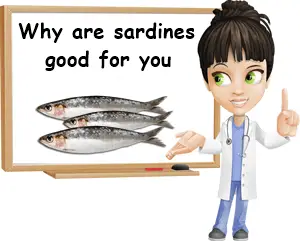Everybody eats salmon because it’s healthy and tuna because it’s the second best thing. But did you know sardines are also good for you? Sardines are just as good as salmon, tuna and other fish and, in some respects, even healthier. In addition to providing generous amounts of healthy Omega 3 fatty acids, they also usually have a lower fat content and less contaminants than other fish species. Considering the nutritional value of sardines easily rivals that of any fish, eating sardines is definitely good for your health.
Why are sardines good for you? What makes sardines healthy is their generous content of several essential vitamins and dietary minerals, notably the sought-after vitamin B12, vitamin B3, vitamin D and phosphorus. Other relevant nutrients in sardines include EPA and especially DHA Omega-3 fatty acids and high amounts of protein. Lastly, some of the health benefits of sardines are a result of their moderately low calorie content, but also good fat content. Here are the top 8 reasons sardines are good for you:

1) Good for memory and learning. Eating sardines is good for memory and learning thanks to their high content of Omega-3 fatty acids, moderate content of cholesterol and high amounts of vitamin B12. The main Omega-3 fatty acid in sardines, docosahexaenoic acid (DHA), is a constituent of nerve cells and even part of the retina. A sufficient dietary intake protects certain nerve cells from losing the insulating coating around their tail-like structure, called the myelin sheath. This allows the nerve cells to efficiently transmit electrical impulses which supports and boosts cognitive functions, especially memory and learning. Vitamin B12 and cholesterol in sardines also protect the nerve cells from losing their protective myelin sheath, further providing benefits for memory and learning.
2) Protect against degenerative nervous system conditions. Dementia, Alzheimer’s disease, multiple sclerosis are examples of diseases caused by nerve cells losing their protective myelin sheath and becoming unable to conduce electrical impulses to other cells, ensuring brain-body communication. Sardines are rich in nutrients like Omega-3 and vitamin B12 that preserve the integrity of nerve cells, potentially reducing the risk of such diseases. Cholesterol, found in good amounts in sardines, is also a vital constituent of the protective coating surrounding the tail of nerve cells and further contributes to protecting against degenerative nervous system conditions caused by demyelination.
3) Reduces brain fog. Brain fog causes you to have foggy thinking and be unable to focus. Eating sardines reduces brain fog and can help improve productivity thanks to its high content of brain-friendly nutrients like Omega-3, cholesterol, B vitamins, especially vitamin B12 (read more about brain fog).

4) Sardines and fertility. Eating sardines provides good amounts of vitamin D, a nutrient found throughout the reproductive system and shown to greatly boost fertility. Also, sardines are rich in vitamin B12 which helps prevent anemia, as well as have a high content of DHA Omega-3 fatty acids which help with brain development of babies in the womb. A good intake of healthy fats is overall needed to conceive and carry a pregnancy to full term.
See also :Sardines vs Herring
5) Improve bone mineral density. Eating sardines provides calcium, phosphorus and vitamin D, all of which improve bone mineral density and regulate natural bone dissolving-bone formation processes, resulting in improved bone integrity and stronger bones and teeth. Sardines bones, which are also edible when cooked, also provide calcium for your bones.
What makes sardine bones so soft they are edible? Sardines are small fish and this means they have small, thin bones to suit their already small frame. Cooking sardines makes the bones brittle and soft, allowing for safe consumption. Canned sardines also typically have soft, edible bones because they are cooked beforehand.
6) Help you sleep better, improve your mood and focus. Sardines provide good amounts of protein and protein is made from amino acids. Amino acids help synthesize neurotransmitters in the brain which, in turn, help produce various chemical messages that regulate mood, sleep, appetite, body temperature, emotions and even heartbeat. Eating sardines can help improve mood, sleep quality, memory and focus via the amino acids it contains.
7) Eating sardines is good for anemia and combats fatigue. Sardines contain lots of vitamin B12. Vitamin B12 is responsible for producing red blood cells that transport oxygen to muscles. A good intake of the vitamin helps combat anemia and some of its most common symptoms, fatigue, muscle weakness, poor concentration, brain fog, palpitations and fast heart rate.
8) Sardines are good for digestion. What makes sardines good for digestion is, first of all, their varied B vitamin profile. B vitamins help synthesize carbohydrates, proteins and fats and provide good energy levels, reducing tiredness and fatigue. B vitamins are also believed to help reduce acid reflux and regulate the production of digestive juices, contributing to better digestion. Sardines also contain good amounts of vitamin D, essential for the health of the immune system tissues in our digestive tract.
